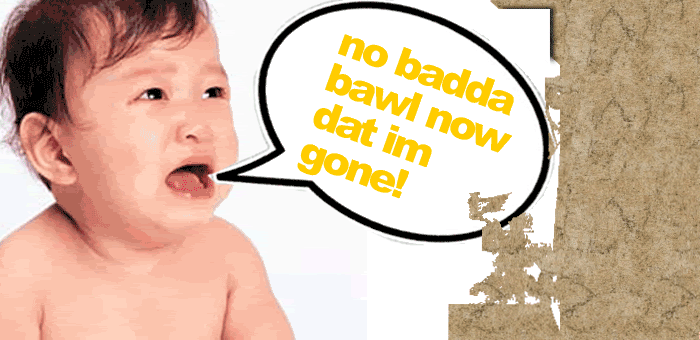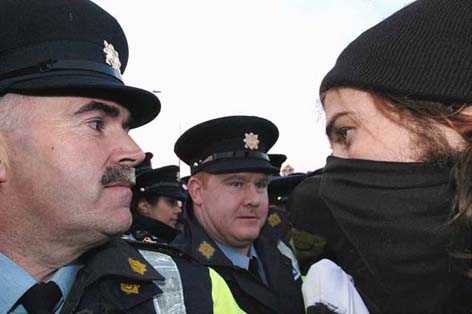
Wednesday, March 17, 2004
A Hatchet Job On Hatching A Plot
 The tirade prone Ireland on Sunday recently pissed itself over a marauding 'global conspiracy' targeting the EU Summit, which has ‘in the past brought two major cities - Seattle and Genoa - to their knees when similar protests turned into bloodbaths with riot police battling armed thugs to protect property'. As one who attended the conspiratorial cabal that was the last publicly advertised anarchist ‘Bad Thoughts’ meeting ‘infiltrated’ by IoS, call me a cynic, but a grin broke across my face, reading the rehashed lies. Ironically, a previous meeting had discussed how the structures organising the media generated bias towards a conservative middle ground. Media control has all the subtlety and invisibility of the hand guiding the free market. Despite the passivity pervading society, its not as if some of us wouldn’t object if banner ads appeared in the press saying ‘anyone expressing dissenting opinions in our pages will be shot.’ Once credited as some unbiased fourth estate, a defender of democratic values and free expression what does the mass media now represent? Why has its role changed? And what the hell can be done about it?
The tirade prone Ireland on Sunday recently pissed itself over a marauding 'global conspiracy' targeting the EU Summit, which has ‘in the past brought two major cities - Seattle and Genoa - to their knees when similar protests turned into bloodbaths with riot police battling armed thugs to protect property'. As one who attended the conspiratorial cabal that was the last publicly advertised anarchist ‘Bad Thoughts’ meeting ‘infiltrated’ by IoS, call me a cynic, but a grin broke across my face, reading the rehashed lies. Ironically, a previous meeting had discussed how the structures organising the media generated bias towards a conservative middle ground. Media control has all the subtlety and invisibility of the hand guiding the free market. Despite the passivity pervading society, its not as if some of us wouldn’t object if banner ads appeared in the press saying ‘anyone expressing dissenting opinions in our pages will be shot.’ Once credited as some unbiased fourth estate, a defender of democratic values and free expression what does the mass media now represent? Why has its role changed? And what the hell can be done about it?There are a number of factors ensuring the mass media plays the role of propagandists, transmitting biased information which mobilises support for governing interests. The concentration of the ownership of the media is one. In the early 19th Century a free press emerged which reflected the interests and identities of working class communities. As the market for small papers grew and the technology of production developed, these papers died out or were consumed by larger entities. Breeching the mainstream has long been a problem for alternative print media reliant on direct sales. In the mainstream, advertisers provide the financial means by which news is produced. Outlets find themselves in constant competition with others to capture the attention of advertising interests. Mitigating against analysis and news stories which directly cut across the carefully cultivated image of brands and advertisers. Can anyone point to an article carrying details of Coca Cola’s campaign of harassment against workers in Colombia with a Coke ad sitting alongside it? A 1992 US study of 150 news editors found that 90 per cent said that advertisers tried to interfere with newspaper content. Recently, Eamonn Gilmore, Labour TD told an audience of UCD students how the Irish Independent refused to carry his party’s response to the housing crisis. Media interests are tied up in intricate knots of profit derived from ads, when news poses threats to this revenue then it is swiftly filtered out.
If advertisers interfere with content, then is it any surprise that owners might? Ireland on Sunday is part of Associated Newspapers Limited, taking in Daily Mail, The Mail on Sunday, Evening Standard, London Metro, and the advertising publication Loot. A glance at their board of directors reveals only 2/15 come from the world of journalism, the rest being representatives of illustrious companies like AIB, the Board of the Reserve Bank of Australia, Euromoney Institutional Investor plc, Carphone Warehouse, shopping centre interests in US, UK and Australia, and the Reuters Group. Professor K Schwab, president of the World Economic Forum, a neo-liberal think tank (which according to some media reports was cancelled in Dublin due to potentially violent anarchist protest) and F P Balsemão, a former conservative Prime Minister of Portugal also pop up.
The media maintains a symbiotic relationship with structures of business and power. The press can’t afford to always have journalists at the frontline of a story instead concentrating them close to the geographic points of power; the White House, 10 Downing Street and so on. While political spin may be ridiculed and lambasted, the media still swallows information dripping from the lips of political elites. As a result journalism becomes unquestionably entangled in reflecting the bias of the points from which their stories derive. Embedded reporting during the invasion of Iraq saw journalists hounding after American military figures for news instead of seeking it themselves, reporters saw and reported what they were directed to see as the conflict was stage managed and directed to suit the interests of coalition forces. Scarily, this process was
echoed amid the protests around the Free Trade Area of The America’s protests in Miami recently, where reporters were embedded in a police operation funded from the $87 billion allocated for Iraq. The national guard and police presence took on all the appearance of a force which occupied both the streets and in turn colonised the media. Journalists wore the same uniforms as cops, differentiated through one small detail; a small badge around their neck identifying them as reporters. TV reports dominated by helicopters footage, suggested the danger of being on the streets. Like Iraq (think the bombing of Al-Jazeer and ‘friendly fire’) media operating outside the system of ‘embedding’ was too pushed outside acceptability, legitimising it as a target of attack. As Ana Nogueira, a reporter for the grassroots TV Network, Democracy Now! found. Filming as police attacked 30 hemmed in protesters, arresting her one shouted "She's not with us, she's not with us.’ Few reported the president of the United Steel Workers Union’s press statement that " the fundamental rights of thousands of Americans … were blatantly violated, sometimes violently, by the Miami police, who systematically repressed our Constitutional right to free assembly with massive force.” Accounts of police terror at the other side of lines of baton wielding riot cops snuck out only through eye-witness accounts published later through independent outlets. Associated Newspapers has found itself in sharp conflict with the NUJ, defying legislation to set aside holiday rights at Xmas and refusing to recognise the union. Last December saw a wave of top journalists jumping ship, one described how "people are just tired of being asked to do hatchet jobs and things that go against their journalistic ethics - that's very hard for any professional journalist."
Going through a crisis of consciousness for being sent to do a hatchet job at the Bad Thoughts discussion she had ‘infiltrated’, Deirdre Tynan of IoS was told by one activist to refer to NUJ ethical guidelines. ' ‘Those don’t apply anymore’ was the response, after all ‘those are from the sixties’ she continued. The corporate media has no room for ‘fair and accurate’ journalism and now opts for ‘conjecture as established fact and falsification by distortion, selection or misrepresentation.' Journalistic ethic are flung out the window, alongside working conditions in the race for sales generating headlines which shock, titillate and seduce middle Ireland into opening their wallets. Ireland on Sunday’s British sister papers have a history of ‘hatchet jobs’ distorting fact and misrepresenting political protest and opinions questioning more than the sex lives of celebrities and perhaps dare question the role of the corporate media. Lucy Morris of the Daily Mail in an article titled 'Armed Guard on Briton Who Led Rioters’ used her poisoned pen to viciously set up an Indymedia activist, Mick Covell, as being "in charge of computer systems used to coordinate attacks on the G8 summit by anarchist groups.’ Covell had been in the Diaz School which was being used as an independent media centre at the height of the Genoa G8 Summt. 51 were injured in a police raid, 31 faced hospital with three requiring surgery, Mick Covell was among the hospitalised. An activist from California recalled "there was blood at every sleeping spot, pools of it in some places, stuff thrown around, computers and equipment trashed." Mick 'Covell, described how he 'wanted to bring an Independent news viewpoint to what was happening in Genoa so that the world would not be lied to by corporate media. My argument was born and justified by what happened in Genoa and then what corporate media did to me as an example of how sick and twisted corporate media can be.' The International Federation of Journalists condemned the raid, while much of the mainstream media chose to remain oblivious, or simply lies.
The opinions of the mass media are an active partisan political force, reflecting the interests of the structures moulding it. It plays the role of transmitting and fostering the ideologies and belief systems of these structures. As we grow up watching TV and reading the corporate press, it socialises us into the hierarchical relationships we accept as our normalised daily environments and acts as a watchdog should any alternative arise to challenge the increasingly homogenised dead end of political sway. It slanders and attacks movements fostering an alternative system of values. The recent IoS article which scare-mongered around the EU Summit epitomised the process. The documentary Chavez; Inside The Coup exposed the role the press played in rearranging the structure of events to bolster a military coup in Venezuela. Protecting the advertising revenue, sales and owners interest is the decisive factor deciding what avoids the chasm of un-newsworthiness, and delineates towards news biased to political and economic elites. No wonder many question the role of the corporate media. Tynan advised one activist in a private email, 'never talk to a mainstream print reporter, the individual reporter may be sympathetic but their editor will never be so.’ With debate in the media stultified , what are we to do?
When the tear-gas settled after the blockades which dogged the WTO talks in Seattle in 1999, the Indymedia phenomenon exploded as an alternative to the sensationalist manoeuvrings of a corporate media which to many seemed to display an witting refusal to carry fact. The network is reclaiming the media from Palestine to Dublin, linked to the political refrain of participatory direct democracy, providing the backbone to those movements which the mainstream media vilifies. As one of those involved in setting up Indymedia.org said at the time “Indymedia erodes the dividing line between reporters and reported, between active producers and passive audience." Finally it seems we can answer back to the mainstream. But then again, just how do you stumble across radical media outlets amid the vast anonymity of an increasingly commercialized cyberspace?
Labels: Indymedia, Media, Politics
(0) comments
About Soundtracksforthem specialises in iconoclastic takes on culture, politics, and more shite from the underbelly of your keyboard. A still-born group blog with a recent surge of different contributers but mainly maintained by James R. Big up all the contributers and posse regardless of churn out rate: Kyle Browne, Reeuq, Cogsy, Chief, X-ie phader/Krossie, Howard Devoto, Dara, Ronan and Mark Furlong. Send your wishes and aspirations to antropheatgmail.com
Label Cluster
In no certain order...
Politics,
Guest Bloggers
Interviews,
Music,
Internet,
Guest Bloggers,
Travel,
Blogging,
TV,
Society,
Film,
Gig Reviews,
Art,
Media.
The Neverending Blogroll
A Womb Of Her Own
Arse End Of Ireland
BlissBlog
BBC One Music Blog
Blackdown Sound Boy
Buckfast For Breakfast
Customer Servitude
Counago & Spaves
C8
Candy PDF Mag
Guttabreakz
House is a Feeling
Homoludo
Infactah
Indymedia
Indie Hour Blog
Jim Carroll
kABooGIE MusIC
Kid Kameleon
Kick Magazine Toronto
Libcom
Matt Vinyl
Modern Cadence
Mongrel
Nialler9
One For The Road
Old Rotten Hat
Pitchfork
Salvo
Spannered
Sigla
Test
Thumped
Newish Journalism
TV Is Crying
Uncarved
Una Rocks
Urban75
Weareie
WSM
Wooster
Village Magazine
Radical Urban Theory
Archives
February 2002
October 2002
April 2003
September 2003
November 2003
December 2003
January 2004
February 2004
March 2004
June 2004
September 2004
January 2005
February 2005
March 2005
April 2005
June 2005
July 2005
August 2005
September 2005
October 2005
November 2005
December 2005
January 2006
February 2006
March 2006
April 2006
May 2006
June 2006
July 2006
August 2006
September 2006
October 2006
November 2006
December 2006
January 2007
February 2007
March 2007
April 2007
May 2007
June 2007
July 2007
August 2007
September 2007
October 2007
November 2007
December 2007
January 2008
February 2008
March 2008
Gig Review: The Fall Tripod
Gig Review: Gogol Bordello
Broken Pencil Gets It's Irish On
Fecking Civil Servents
Fake Pharma Ads
Vidiot: Data Entry
Life and Debt
Last Night Cosmo Baker Saved My Life / Hip Hop His...
Eye Candy: Dufferin Hoarding Gallery
Review: Heads for the heart of the Sun – The Welco...
